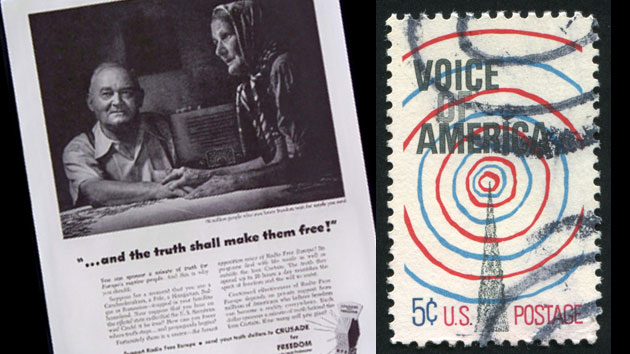
Voice of America/Voice of America and <a href="http://www.shutterstock.com/pic-100021496/stock-photo-usa-circa-a-stamp-printed-in-usa-shows-the-radio-transmission-tower-and-waves-voice-of.html?src=Bc5pptpOy-3u93Mw-42WZg-1-1&ws=1">irisphoto1</a>/Shutterstock
On January 21, Andrew Lack, the media titan who at different times has headed Bloomberg, Sony, and NBC News, was sworn in as CEO of the Broadcasting Board of Governors, the federal agency that oversees the five official US government-supported broadcasters, including the Voice of America. Together, these outfits operate more than 50 news bureaus and offices worldwide, with more than 3,500 journalists, producers, and technicians. During the Cold War, the BBG’s precursor, the US Information Agency, was the powerful propaganda arm of the US government, trying to bring American values, information, and news to closed-off societies behind the Iron Curtain and elsewhere. Then it was an agency with clout and a well-defined goal, but there’s a question as to the purpose of the BBG these days and, moreover, whether this quasi-independent federal agency is too much of a wreck to deliver on whatever its mission may be.
In recent years, the BBG has devolved into a widely acknowledged mess: bloated, demoralized, and inefficient. Reviving this tool of public diplomacy will be a major challenge for Lack. In 2013, then-Secretary of State Hillary Clinton, testified before Congress that the BBG was “practically defunct in terms of its capacity to be able to tell its message around the world.” That year, the State Department Inspector General, charged with evaluating the BBG, interviewed board members, senior staffers, and outside observers, subsequently reporting that “the word most commonly used to describe the BBG was ‘dysfunctional.'” The agency’s “record of poor management of taxpayer-funded resources—financial, physical, and human—has undermined the confidence that Congress and the American public have in these efforts,” Dan Robinson, a former Voice of America Chief White House correspondent, wrote in an op-ed last March.
In his first few weeks on the job, Andrew Lack is still mapping out a plan for the agency while he visits the BBG’s stations around the globe. “We are at a unique time in the extraordinary history of this agency,” he tells Mother Jones. Here are some of the problems that he will have to contend with when he gets home.
Poor management: BBG’s official mission, according to the 2013 IG report, is “to advance US foreign policy by providing an example of free press and free media in countries where such freedom does not exist, and to represent the United States, its people, and its policies.” It spends about $700 million a year to reach a weekly audience of 215 million in about 100 different countries, according to its internal reports.
In 1998, the Foreign Affairs Reform and Restructuring Act created an incredibly complicated organizational and funding structure for the BBG. Two of its broadcasting agencies—the Voice of America and the Office of Cuba Broadcasting—are part of the International Broadcasting Bureau, which is funded through tax-payer money.* The three others—Radio Free Europe/Radio Liberty, Radio Free Asia, and the Middle East Broadcasting Networks—are private nonprofit corporations financed largely by federal government and private grants.
A nine-member board controls the BBG. Eight of them are presidential appointees—split evenly between Democrats and Republicans—who serve three year terms. The ninth member is the Secretary of State. Several media luminaries have served on the board over the years, including Sony’s CEO Michael Lynton, Aspen Institute President Walter Isaacson, and the late David Burke, a former CBS News president and ABC News executive. The current chair of the board is longtime Comcast executive and NBC Universal chair Jeff Shell.
The board has been a major source of the BBG’s dysfunction. Its members are supposed to supervise the BBG’s sprawling operations by providing strategic plans and budget priorities while keeping their hands off the journalism and the day-to-day operations. The 2013 State Department IG report quoted a former BBG board chair who said that the board system was “structurally a mess,” plagued by “unclear lines of authority,” the report writers furthered, and a failure at establishing priorities. The BBG is overseen by high-powered people who have other jobs and who meet only once a month (if that). Big personalities on the board have made a bad situation worse. The IG report refers to an unnamed board member who often mounted “personal attacks on colleagues and staff” and “created an unprofessional and unproductive atmosphere,” adding that board dynamics rose to the level of “hostility.” The board took a year to implement a top recommendation the State Department IG issued in the 2013 report: Hire a CEO to really run the place.
The inclusion of such high-powered media players on the board opens the door for possible conflicts of interest. The current chairman, Jeff Shell, was appointed by President Obama and has headed the BBG board since August 2013. He makes $155,000 a year* as chairman of the BBG and is responsible for supervising the grants it makes to the three nonprofit broadcasters, Radio Free Europe/Radio Liberty, Radio Free Asia, and the Middle East Broadcasting Networks. Last year, he was in charge of recruiting Lack as the BBG’s new CEO. Shell was a longtime Comcast executive, former chair of NBC Universal, and currently chairman of Universal Filmed Entertainment, a company owned by Comcast.
Do Shell’s Comcast and NBC Universal connections pose a conflict of interest? The Committee for US International Broadcasting, a nonprofit dedicated to protecting media freedom abroad and at home, thought they might. In January 2013, it sent Shell an open letter pointing to “the inevitable conflicts of interest” his nomination would pose. The letter maintained that Shell could be in a difficult position, given that NBC Universal does business in repressive countries (say, Russia and China) where government permission or forbearance is necessary and that BBG broadcasters try to operate in these areas and are often at odds with those governments.
According to a BBG spokeswoman, Shell responded to the group’s letter by meeting with its members several times and has “been very responsive to their input.” Shell, she says, was chosen for his media expertise and and was thoroughly vetted by the White House Office of Presidential Personnel before his nomination to ensure “there’s no conflict of interest.” Shell, she says, often speaks out against persecution of foreign journalists in countries where NBC Universal does business, she notes, and he donates all his BBG earnings to charity.
Terrible morale: BBG staff morale is in the pits. A watchdog website called BBGWatch.com—which was started in 2010 by Ted Lipien, a former Voice of America editor—has claimed this is a major problem for the BBG. According to a government survey of BBG employees, management efforts aimed at improving the internal BBG culture—which included ice-cream socials and Halloween parties—were largely seen by staffers as “meaningless gimmicks” to distract attention from senior management issues. In 2014, the Office of Personnel Management conducted a survey of the BBG workforce, and only 40 percent of employees said they would recommend their organization as a good place to work—a more than 6 percent drop from the previous year. In October, the BBG employee union called for “change at the senior management levels” to address the “ongoing morass” at the agency. In one odd episode, Voice of America senior management in October 2014 reportedly sent out an open email request to Voice of America Journalists calling for volunteers to take the experimental Ebola vaccine and report on the experience. One VOA journalist told BBG Watch that the request was “journalistically unsound on many fronts”; another described it as “bizarre.”
Losing the information battle internationally: The day after Lack was sworn in as CEO of the BBG, the New York Times wrote about a growing information battle among the United States, Russia, China, and other countries that have spent a large amount of time and money on government-owned media operations. In October, BBG Watch noted that the Voice of Russia, Russia Today, Al Jazeera, and China’s international broadcasting companies “are taking advantage of the world’s appetite for American news while capitalizing on VOA’s news failures.” All of these news organizations have similar missions: broadcasting internationally but not to their domestic markets. Voice of America’s English news website is ranked 3,961st globally, according to data provided by Alexa, a California-based web traffic analytics site, but Russia Today, which is owned and funded by the Russian government, is ranked 378th. Russia Today had a budget of about $445 million last year, more than $200 million less than the BBG, but it has surpassed VOA in social media. * The VOA’s Twitter feed has only 131,000 followers; Russia Today has 865,000. According to Russia Today’s website, the broadcast reaches around 700 million people total—about 85 million of those in North America alone.
Last June, Voice of America editors complained to David Ensor, a National Public Radio veteran who now heads Voice of America, that they do not have enough news material for their radio and TV broadcasts and the Voice of America website because of severe staff shortages and mismanagement by senior executives. Maybe that is why during the 2014 midterm elections the BBC and other foreign outlets beat the Voice of America, in reporting the Republican takeover of the US Senate by several hours.
Voice of America does not directly compete with outlets like RT, or even domestic outlets like CNN or MSNBC, but has a responsibility to deliver clear, unbiased (though pro-American) news quickly to its own audience abroad—to inform as well as to counter those countries’ own propaganda. Although media outlets like CNN and MSNBC also reported these events in near real-time, the radio broadcasts of Voice of America reach another audience who do not have access to computers or televisions with international cable access.
In September, Rick Stengel, the undersecretary of state for public diplomacy and a former Time magazine managing editor, declared that the social-media battle against Russia is an area the US “should own, but we don’t.” One reason can be found in BBG staff resistance to the changing media landscape in which web-based news and social media are increasingly dominant, an issue commonly brought up on the BBG Watch watchdog website. “The whole internet strategy is bogus,” a former BBG official complained to the Washington Times during the initial transition in 2011. In 2011, the BBG began to shift broadcasts from radio and television to the internet and social-media outlets, but many BBG insiders, including former executives, protested. BBG staffers worried that international communities wouldn’t have access to internet streaming, or that the web strategy was just a part of budget cuts that would cripple the agency, according to the Washington Times. Others feared the so-called vulnerability of the internet to hackers and connection failures. However, by not embracing the internet, the BBG fails to reach and engage many readers, viewers and listeners as quickly or effectively as it could.
Last summer, Rep. Ed Royce (R-Calif.) said at a congressional hearing that the United States is “losing the information battle” with Vladimir Putin, because the BBG is defunct and is weakening the United States’ ability to broadcast the government’s views abroad. “Who is going to offset [Russian] propaganda?” Royce asked. “This…is about communicating America’s message of pluralism, tolerance, transparency, to foreign audiences. There was a time when we did that really well, but we have lost it.”
Is it an anachronism? The Voice of America began during World War II as the official government news service of the United States, broadcasting around the globe in a variety of languages. During the Cold War, when the Soviet Union controlled all the media in its satellite countries, radio waves from the Voice of America could penetrate the Iron Curtain and provide news and information, breaking the isolation of many citizens who lived there. But in today’s society, dominated by the Internet and more connected than ever, does the BBG still serve a purpose?
The BBG believes it does. The BBG spokeswoman points out that the agency penetrates isolated areas “bombarded with vitriol and misinformation,” and offers democratic ideals and unbiased news. “In 2014, BBG networks were the first international broadcasters live streaming the events from Maidan in Ukraine, led coverage on the rise of the Islamic State of Iraq and the Levant, and continued reporting on the front lines of the Ebola crisis,” she says.
Incoming BBG chief Andrew Lack told the New York Times after his appointment, “We are facing a number of challenges from entities like Russia Today, which is out there pushing a point of view, the Islamic State in the Middle East and groups like Boko Haram, but I firmly believe that this agency has a role to play in facing those challenges.”
The government-funded media produced by the BBG, supporters say, is better than commercial broadcasts: It is reported in different languages, is uncensored, and explains specific American policies and ideas for information-deprived audiences who the BBG spokeswoman describes as the “most repressed and least privileged.” Commercial networks are not equipped or interested in delivering specially tailored newscasts to isolated audiences who are not likely to yield a profit. “It’s not something that the United States and US taxpayers can safely abandon thinking that private media and private sector will fill the gap,” says Lipien from BBG Watch. “They will not, and the stakes are very high for US national interests and security which are directly tied to how well free media, human rights and democracy are doing abroad.”
Ann Cooper, a professor of journalism at Columbia University who covered the Soviet Union during the Cold War, looks at Russia and sees a continuing need for the BBG. “There is little criticism of the government and much self-censorship under Russian journalists,” she says. “That is also true among journalists in quite a few of the former Soviet republics.” Citizens in these countries, she contends, might again reach out to Voice of America and Radio Free Europe as they did during the Cold War, when Cooper was reporting from Moscow for National Public Radio.
But while Lack tries to refocus and overhaul the agency, the BBG has come under attack by members of Congress. Rep. Matt Salmon (R-Ariz.), the chair of the House subcommittee on Asia and the Pacific, proposed eliminating BBG as a part of his “Shrink Our Spending” initiative. He claims that the Voice of America has become “another duplicative, federal program…and has fallen into the rut of merely mimicking other news outlets by simply reporting news.”
A bipartisan bill proposed by Rep. Eliot Engel (D-N.Y.) and Rep Ed Royce (R-C.A), which passed the House foreign affairs committee last year, would change the entire structure of the BBG, and turn the Voice of America into more of an explicit megaphone for US policy. The bill sparked some controversy; former and current Voice of America journalists claimed this would transform the Voice of America from a respected media outlet into a distrusted propaganda arm. Voice of America reporter Al Pessin complained that Congress was trying to change the broadcaster into something that is “fundamentally not American.” The bill is expected to be reintroduced in the House, and a similar measure is being crafted in the Senate.
With all he has to contend with at the BBG, it’s no wonder that Lack these days is talking about the future. “The 21st century’s global war on information is increasingly threatening to our country and our values,” Lack says. “I am lucky to join a great group of journalists and news professionals spread across the globe who care so deeply about our critical role in that battle.”
Correction: An earlier version of this article misstated the funding source for BBG. It is not funded through the State Department but is an independent federal agency.
Correction: An earlier version of this article reported Jeffrey Shell’s salary was $155,000. The original story did not pro-rate Shell’s salary to reflect the part time nature of his work.
Clarification: A BBG spokeswoman disputes our characterization and notes that we compared “VOA to RT but use a BBG total budget figure—VOA’s Fiscal Year 2015 budget is about $214 million, less than half of RT’s.” She also states that the BBG is “neither ‘pro-American’ nor ‘anti-American.'”














